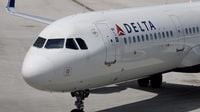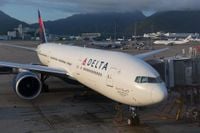On the morning of Monday, July 7, 2025, Delta Air Lines flight 1334, a Boeing 757 traveling from Atlanta, Georgia, to Fort Lauderdale, Florida, was forced into an emergency landing at Southwest Florida International Airport in Fort Myers after a passenger's lithium battery-powered device caught fire midflight. The flight, carrying 185 to 191 passengers and six crew members, declared an emergency around 8:30 a.m. after smoke was detected in the cabin, prompting quick and decisive action from the flight attendants.
According to Delta, the flames originated from what is believed to be a personal battery inside a passenger's backpack. Flight attendants promptly extinguished the fire using their training and deployed a fire containment bag to safely isolate the device. The pilot radioed firefighters upon landing, stating, "The backpack has been contained. We think it was a lithium battery that caused the smoke and the fire. It's in a containment bag. No smoke in the cabin at this point. No active fire." Thankfully, no injuries were reported during the incident.
The situation was declared an emergency out of an abundance of caution, and the plane was diverted approximately two hours away from its original destination to Fort Myers. First responders were on hand to ensure the safety of all aboard. One passenger captured a now-viral video showing firefighters in full protective suits walking down the aisles as passengers remained seated, waiting for clearance to disembark. Another eyewitness described being woken from sleep by screams and the pungent smell of smoke, illustrating the tense atmosphere on board.
Delta Airlines expressed appreciation for the swift response of its crew, stating, "We appreciate the quick work and actions by our people to follow their training, and we apologize to our customers for the delay in their travels." The Federal Aviation Administration (FAA) is currently investigating the incident to determine its exact cause and to assess safety protocols.
This event is part of a growing trend of lithium battery incidents on U.S. flights. The FAA has reported 34 such incidents in the first half of 2025 alone, averaging nearly six events per month. While this is a slight decrease from 2024’s average of more than seven per month, it still represents a significant safety concern. Since the FAA began tracking lithium battery incidents in 2006, there have been 632 reported cases, with over one-third (246) involving portable battery packs.
Lithium batteries power a wide range of personal electronic devices such as laptops, tablets, cell phones, vape pens, and portable chargers. Their popularity has surged in recent years, but so have safety risks. The FAA warns of the potential for these batteries to undergo "thermal runaway," a dangerous process where the battery experiences an uncontrollable and rapid rise in temperature and pressure, releasing flammable gases and potentially igniting a fire.
Several factors can trigger lithium battery fires, including physical damage (such as crushing or penetration), electrical issues like overcharging or using incompatible chargers, exposure to extreme temperatures, and manufacturing defects. The National Fire Protection Association highlights that these risks necessitate careful handling and regulation, especially in confined spaces like aircraft cabins.
Incidents like the Delta flight’s are not isolated. Earlier in 2025, an American Airlines flight from Indianapolis to Los Angeles was diverted to Chicago after a portable battery charger caught fire, and a United Airlines flight from Washington Dulles to San Francisco dealt with a cell phone undergoing thermal runaway, which was contained by the crew using a thermal containment bag. These examples underscore the ongoing challenges airlines face in managing lithium battery safety.
In response to these risks, regulatory bodies have implemented rules to mitigate dangers. The FAA and Transportation Security Administration (TSA) prohibit portable chargers and spare lithium batteries in checked luggage but allow them in carry-on bags. However, some airlines have taken stricter measures. For instance, in May 2025, Southwest Airlines became the first U.S. airline to ban passengers from charging devices with power banks inside carry-on bags, requiring that portable chargers be used only in plain sight. This policy aims to enable flight attendants to quickly detect and respond to overheating devices.
Internationally, Singapore Airlines has gone even further by completely banning power banks from being used or charged in-flight. These evolving policies reflect a growing awareness of lithium battery hazards and a commitment to passenger safety.
Travel officials also advise passengers to turn off devices containing lithium batteries during flights rather than leaving them in sleep or hibernation modes, which may still allow the battery to generate heat. Many everyday items contain these batteries, including children's toys and cameras, so awareness is crucial.
As personal electronics continue to integrate lithium-ion technology, the aviation industry faces the ongoing challenge of balancing convenience with safety. While incidents remain relatively rare, the dramatic rise in lithium battery fires on aircraft—from just nine reported in 2014 to nearly 90 in 2024—signals the need for vigilance and adaptation.
The Delta flight emergency in Fort Myers serves as a stark reminder of these risks and the importance of preparedness. Thanks to the quick actions of flight attendants and first responders, what could have been a catastrophic event was contained without injury. Still, the FAA’s ongoing investigation and the airline industry's evolving safety measures highlight that the story of lithium battery safety in aviation is far from over.





